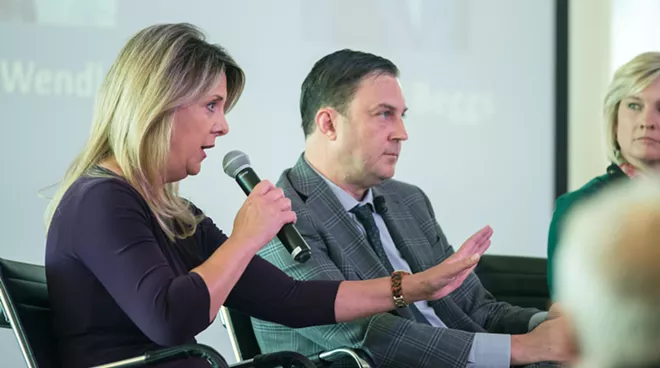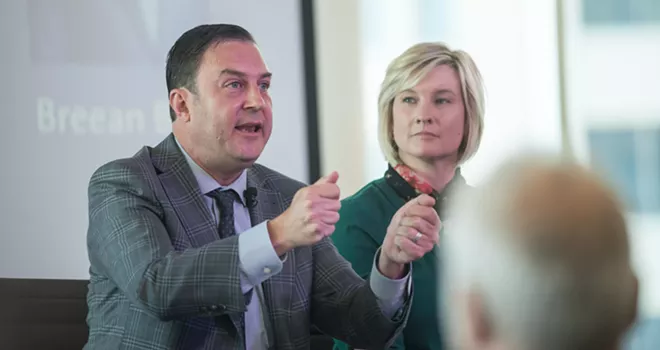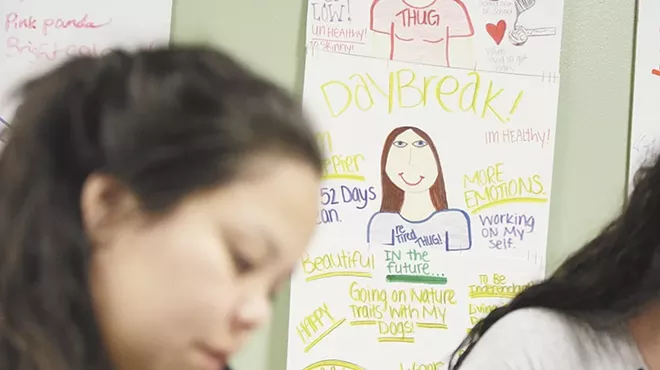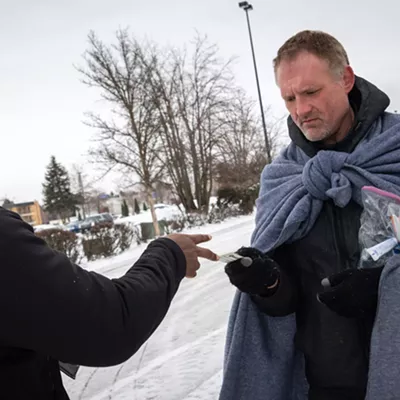Mayoral candidate Ben Stuckart has traditionally been supportive of Housing First, a model championed for decades by the Housing and Urban Development Department. It relies on a simple notion: It's more effective and more cost-efficient to first house people before treating underlying conditions of homelessness, such as mental illness and drug addiction.
"We have $12 million riding on Housing First," Stuckart stressed. "That would all go away and we would have thousands more people in our community homeless if we did not use Housing First."
But his opponent in the mayoral race, former KXLY anchor Nadine Woodward, has been highly critical of the Housing First model, and the housing units that have resulted from it.
"They're not getting the help that they need," Woodward said in an interview on KYRS in June. "They're being warehoused."
Woodward argued that the spate of Housing First units in downtown Spokane were hurting businesses.
"We have 250 units within a two-to-three block radius of downtown Spokane. That's where a lot of the police calls go to. The businesses are all struggling," Woodward said. "I wish they were spread out more. I wish we didn't have 250 of them in the gateway of our beautiful city. People come off I-90, that's the first thing they see."
She shares the critique that Union Gospel Mission has had for Catholic Charities' low-barrier shelters and Housing First model, referring to the low-barrier approach as "enabling."
During yesterday's mayoral forum, Woodward cited the comments of HUD Secretary Ben Carson to bolster her position.

Carson, when he toured Spokane's EnVision Center last month, did make the comment, “we believe in Housing First, but we also believe in Housing Second, and Housing Third.”
So is that the right way to read Carson's comments? The Inlander called up HUD to ask.
Brian Sullivan, spokesman with HUD, was unequivocal. When Carson said "Housing First, Housing Second and Housing Third" it was his way of stressing how utterly committed HUD is to the Housing First model.
"He's placing emphasis on Housing First being critical, especially for those experiencing long-term homelessness," Sullivan says. "That’s just his way of expressing the department's devotion to this model... That's not to be seen as him de-emphasizing that for heaven's sakes."
Carson expanded on the definition in a speech in May:
In other words, Carson was referring to continuing to support people with services and get at the root causes of their homelessness after they were housed.
"Our Housing First model serves veterans through data – rather than through doctrine, or mere guesswork.
"But it's not simply Housing First — it's Housing First, Second, and Third.
"First, we make sure a person gets a permanent place to stay; second, we diagnose what left this individual without a home; and third, once we figure out what went wrong, we start putting things right.
"For each diagnosis, there is be a different, flexible prescription. Of all the issues facing our veterans - unemployment, mental illness, opioid abuse, depression, post-traumatic stress, or injury – stable housing sits at the center. A veteran will not beat addiction from a street corner, nor find a steady job without a steady address."
Asked if Carson had retreated at all from the Housing First model, as some observers worried after his nomination, Sullivan responded with an "emphatic no."
"Housing First is a proven practice," Sullivan says. "It’s reduced homelessness in this country."
Norm Suchar, who directs HUD's homeless assistance program, says that most housing programs receiving federal dollars are barred from kicking people out of housing for using drugs or refusing to get treatment. (Violence or dealing drugs is another matter, he says.)
That said, he says that there are allowances made for programs run by drug treatment organizations, and he says that, during this last round of funding, HUD has allowed more local governments to put requirements on people in order to continue in HUD-funded programs. Yet HUD officials do not believe attaching strings to housing is an effective approach.
"We always have this balance between promoting best practices and things with evidence behind them and also allowing flexibility with different approaches," Suchar says. "I think it’s very clear from the evidence, this is HUD’s view — and everyone’s view who spends any time looking this at this — is that [Housing First] has a lot of evidence behind it."
But what about the traditional "tough love" model, that requires people to shape up before getting access to shelter or housing?
"Before Housing First, there was that 'tough love' approach. And the street population exploded," Sullivan says. "We’re still dealing with the challenge of unsheltered homelessness across the country. But really, there’s nothing to show homeless that Housing First doesn’t work.”

"You could look at that and say what would the problem be like without Housing First," Sullivan says. "Right now the issue is that there is a general lack of affordable housing."
At the candidate forum, Stuckart and Woodward also clashed heavily over the city's efforts to build a new homeless shelter.
Woodward has previously been unequivocal that she does not support the city funding low-barrier shelters at all.
"I do not support buying more shelters that are 24/7 and low-barrier," Woodward told the Spokane Talks radio show. "If you expand the shelters you are going to expand the population."
At the forum, Woodward called the city's recent efforts to buy a new shelter "an absolute disaster."
"Personally, I think we should wait to see what happens with the Court of Appeals in the Boise vs. Martin case," Woodward said. "I don't think we should be investing in anything before we know exactly what we can and cannot do as a city in helping our homeless and addressing the homeless challenge."
Boise has appealed to the Supreme Court, but Stuckart argues that even if the Supreme Court takes the case, it would take at least a year for the verdict to come out.
"I'm not going to take a gamble and not follow the law," Stuckart said at the forum. "If we do not want to be Seattle, then we have to have shelters. If we do not have shelters open we will have camping in every city park this winter. We will have camping everywhere and there is nothing we can do about it."
But Woodward, who earlier in the forum argued the city could have found money to pay for police officers without raising taxes, stressed that the city didn't have enough money to buy any additional shelters and should take time for the legal landscape to settle before making its decision.
"I say we wait a year and we'll see what happens," Woodward says. "In the meantime, we can contract out with warming centers."





























